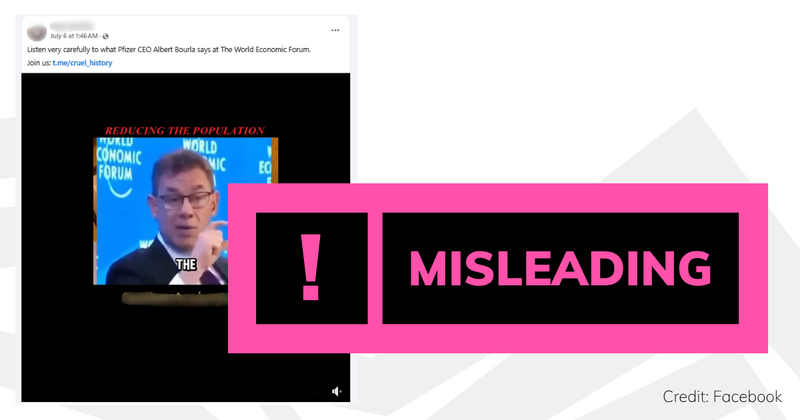A debunked clip of the CEO of Pfizer, which has been edited to make it appear that he says a company goal is to reduce the world population by 50%, has been circulating again online.
The video, which has been shared on Facebook and X (formerly Twitter), shows Albert Bourla, the chairman and CEO of the drug company Pfizer, speaking on a panel.
He appears to say: “Goals for the next five years, and one of them was by 2023 we will reduce the number of people in the world by 50%. I think today this dream is becoming a reality.”
But as we also stated in previous fact checks of the same video, this footage has been edited and Mr Bourla did not say it was a goal to reduce the world’s population by half.
The original video was recorded at the World Economic Forum (WEF) at Davos in 2022.
In that footage, Mr Bourla said: “One of [the goals for the next five years] was by 2023 we will reduce the number of people in the world that cannot afford our medicines by 50%. I think today this dream is becoming a reality.”
The video circulating on social media has been edited to remove the section where he says “that cannot afford our medicines”.
The video also includes a second, genuine clip, in which Mr Bourla talks about a “biological chip” which can be added into a tablet, which sends a signal once the tablet has been taken and digested.
This clip is from footage of a panel on “Transforming Health in the Fourth Industrial Revolution”, which took place at a different WEF in 2018.
It appears that Mr Bourla was talking about a tablet containing a sensor and a body-worn patch able to signal to an app when the medication had been ingested, which had received approval from the US Food and Drug Administration (FDA) in 2017. This was created by two other companies, rather than Pfizer itself.
He highlights this drug and its ingestible sensor as an example in response to a question from the audience on how technology can be used to engage with patients.
Full Fact has seen and debunked other misinformation about Mr Bourla, as well as misleading claims about the WEF.
Before sharing videos that you see on social media, consider whether they come from a reliable source, or whether they could have been edited to mislead. Our toolkit and guide to identifying misleading videos can help you do this.
